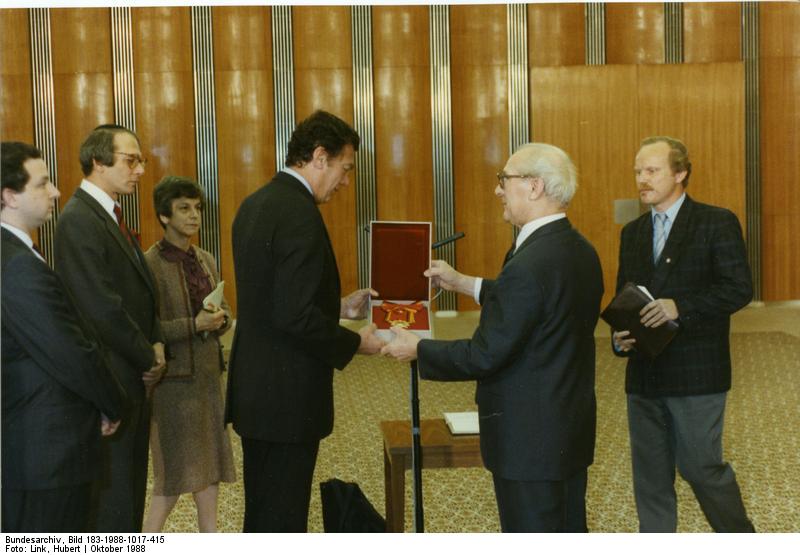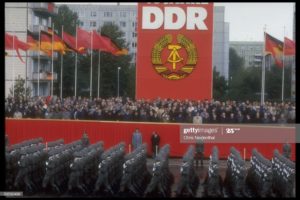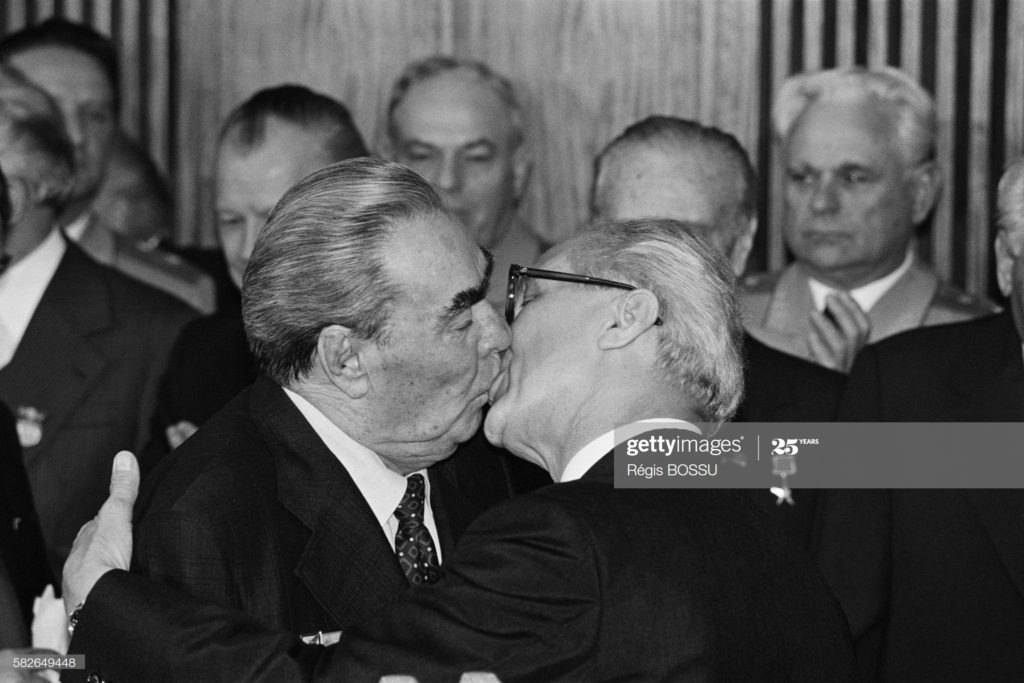
Soviet East German dictator Erich Honecker awards Lansky Crime Syndicate Russian-Jewish operative Edgar Bronfman Senior the Gold Star of People’s Friendship for his services on behalf of world communism.
By Scott Thompson
July 3, 1992 Anno Domini
EIR
Edgar Miles Bronfman, a leading figure in many of the witch hunts conducted by the Office of Special Investigations, was among the top collaborators of the KGB and East German intelligence (the Stasi) in the West. Whiskey baron Bronfman of the Seagram’s empire has promoted the “Big Lie” tactics of the OSI and communist intelligence organs, both as head of the World Jewish Congress and as an honorary vice-chairman of the Anti-Defamation League of B’nai B’rith (ADL).
One of the most infamous cases in which Bronfman has been involved is that of Austrian President Kurt Waldheim, who was banned from entering the United States in 1986, on unsubstantiated charges that, as a 20-year-old lieutenant in the Wehrmacht during World War II, he was responsible for war crimes.
A review of the Waldheim case, and other leading cases in which Bronfman has been involved with the OSI, begins to show why, on Oct. 17, 1988, now-deposed East German dictator Erich Honecker awarded Bronfman the Gold Star of People’s Friendship, the G.D.R.’s highest civilian honor.

• Arthur Rudolph. When Moscow railed that President Ronald Reagan’s Strategic Defense Initiative was a casus belli, Bronfman and the OSI worked in tandem to drive rocket scientist Dr. Arthur Rudolph, who was then engaged in SDI related research, out of the United States. The WJC’s governing board adopted a resolution at its January 1985 meeting in Vienna for Jews to oppose “space weapons.” Bronfman suggested that the Soviets complement their psychological warfare against “Star Wars” with an effort to liberalize Jewish emigration, to “undercut cold warriors on both sides.” Bronfman gave WJC support to a Soviet intelligence operation against American scientists developing the new systems, namely Dr. Rudolph, who was falsely accused of “Nazi war crimes” by the OSI within months of President Reagan’s March 23, 1983 SDI speech (see preceding article).
• The Bitburg affair. When in April 1985, President Ronald Reagan indicated that, while visiting in West Germany, he would pay his respects to German war dead at the cemetery at Bitburg, the WJC charged that two Nazi SS officers were buried there and that it would go on an international mobilization to stop the visit. After that campaign, Bronfman, who had been talking to Soviet official Aleksandr Sukharev, announced that he was traveling to Moscow to obtain an increase in Russian Jewish emigration to Israel. Sukharev was the Russian Republic’s justice minister, and he had been a party to the OSI liaison to the KGB disinformation services forged with “Stalin purge trial ” Procurator General Rudenko.
• President Kurt Waldheim. On his return from Moscow, Bronfman threw the WJC into its next major “Nazi hunt.” This time the target was former United Nations Secretary General Kurt Waldheim, who won the race for Austrian President despite efforts of Bronfman and the OSI to defame him. Bronfman employed tactics ranging from distortion of facts to alleged bribery of witnesses, which drew angry condemnation from Nazi hunter Simon Wiesenthal, among others. Wiesenthal repeatedly poked holes in Bronfman’s vendetta against Waldheim. As early as March 11, 1986, Wiesenthal said that there was no evidence to support the war crimes accusations. On April 4, 1986, the Jerusalem Post attacked the WJC for “cheap demagoguery,” asking “whether it is the course of wisdom to leave the management of the Waldheim affair to the sometimes curious ministrations of the World Jewish Congress.” On June 23,1986, Wiesenthal said that the WJC’s evidence does not show that Waldheim “recommended a crime or that he ordered a crime.”

One of the little-known features of Bronfman’s campaign against Waldheim, is that Waldheim stood in the way of a deal Bronfman was seeking to clinch, trading grain to the Soviets for direct flights of Russian Jews to the Israeli Occupied Territories. With Vienna as the stopover for the exodus of Russian Jews, it is notable that the Austrian President believed they should be free to travel from on to wherever they chose—which was usually to the United States. Bronfman worked with the OSI, providing fraudulent evidence against him, to have him declared persona non grata in America.
At the May 6-8,1990 conference of Bronfman’s World Jewish Congress held in Berlin, OSI director Neal Sher defended the practice of taking evidence from communist countries.The ban on Waldheim’s travel to the United States, he said,” is the accomplishment of which I am most proud…. Waldheim has tried hard and often to be removed from the list. But all such approaches to our government have been rebuffed; he will remain persona non grata.”
• The Jenninger affair. The Waldheim affair became a springboard for a similar Soviet-Bronfman-OSI campaign, which resulted in political destabilization of the government of West German Chancellor Helmut Kohl, when on Nov. 11,1988, Bronfman led the charge demanding the resignation of West German Parliament President Philipp Jenninger. The pretext was a gross distortion of phrases taken out of context of a speech by Jenninger, that sought to depict Jenninger’s passionate description of what had happened to Jews on the Nazis’ Kristallnacht (Night of Broken Glass) was sympathetic to Nazism. While Bronfman called for Jenninger’s head, the inside job was carried out by the Association of Victims of the Nazi Regime (VVN), part of the KGB’s Disinformation Service A, run through the East German Stasi.
The truth comes out
In March 1992 , after Kohl met with President Waldheim, Bronfman went on a tirade against the German leader that prompted Kohl to respond: “I want to recall that a leading emissary of the World Jewish Congress was in East Berlin …[shortly after the Berlin Wall bame down in November 1989] and spoke there in an outrageous way against German unity and the right of the Germa people to self-determination.”
The meeting to which Chancellor Kohl referred had been documented in the daily Frankfurter Allgemeine Zeitung on Dec.21, 1990 by Michael Wolffsohn, a German Jew working as a lecturer at the German Armed Forces College in Munich, who is a longtime adversary of Bronfman. Using East German documents and letters from the East German Foreign Ministry files found after the re-unification of Germany, Wolffsohn documented high-level talks between envoys of the WJC and the Communist regime between October 1988 and May 1990. Bronfman gave the go-ahead for dIrect talks in late 1988.

According to one Foreign Ministry protocol cited by Wolffsohn, on Oct.17, 1988, Bronfman was awarded the Gold Star of People’s Friendship. Said Bronfman, in an interview to Newsweek magazine two weeks after his East Berlin visit, “Seen from a Jewish standpoint, I see no reason that the G.D.R. does not deserve Most Favored Nation [trade] status from the United States.” Bronfman also called for the U.S. to invite Honecker to Washington on a state visit.
Bronfman had received East Germany’s highest civilian award only weeks before he participated in toppling the head of the West German Parliament.
Other documents cited by Wolffsohn reveal how the WJC maintained close contact with the SED, or East German communist party, providing business channels to U.S. firms competing with West German companies, working with unnamed officials of the U.S. State Department to wreck German unification, and providing a back channel to Israeli diplomats who were favorable to the survival of a separate communist state in East Germany.
In one particularly damning letter to East German Foreign Minister Oskar Fischer, dated Nov. 30, 1989, Mararn Stem, Bronfman’s western European WJC representative, congratulated the communist on his re-appointment as minister, declaring, “The WJC is a friend of the G.D.R. and will continue to be.” Boasting that his boss Edgar Bronfman had enormous clout in Washington, Stem promised that the WJC would work behind the scenes to prevent the “selling out of the G.D.R. to the F.R.G.”
‘Ugly deals’
Dirty politics combined with dirty business deals has been a cornerstone of Edgar Bronfman’s actions. As EIR’s authors reveal in the book Dope, Inc., the Seagram’s fortune inherited by Bronfman was built on the bootleg booze and prostitution activities of the first Bronfman in Canada, Yechiel, during Prohibition. According to the March-April 1990 issue of the German-Jewish magazine Semit, at the same time that Edgar Bronfman was signing whiskey deals with East Germany, and targeting western leaders like Waldheim as Nazis, he was involved in similar deals through the U.S.-U.S.S.R. Trade and Economic Council (USTEC).
In a Jan. 23, 1989 syndicated column titled “Swap Soviet Jews for U.S. Trade,” Rowland Evans and Robert Novak revealed that the booze baron had held a secret meeting at his New York City apartment to propose, once again, waiver of Jackson-Yanik trade restrictions, if the Soviets would ship thousands of Jews to the Occupied Territories of the West Bank. Present were Dwayne Andreas, who is both chairman of USTEC and of the grain cartel Archer Daniels Midland, and James Giffen, who was then the president of USTEC.
Reported Evans and Novak: “On the table was this deal. Andreas, Gorbachov’s most intimate American business friend, would persuade the Soviet President to start direct air flights to Israel for Jews, most of whom would rather corne here, while the pro-Israel lobby would use its considerable clout to get Congress to repeal or waive the Jackson-Vanik amendment. ‘An ugly deal,’ one former official told us. ‘Jackson-Vanik is a statute with specific provisions. They say nothing about Jews and nothing about Israel.'”
